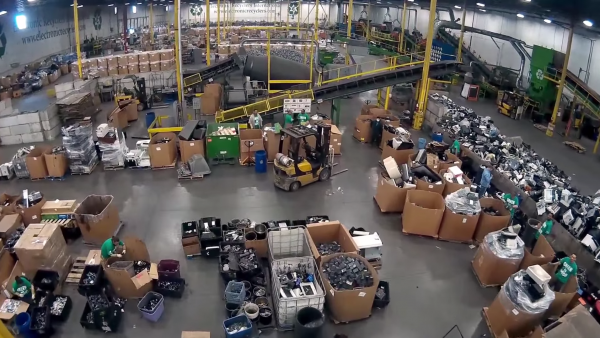
It’s easy to make the mistake of assuming that every recycling center is alike, but that’s not true. Often the big differentiator is the level of certification a recycler has obtained. Certifications and standards registration help set apart the trustworthy and compliant from the less than reliable counterparts in the electronics recycling industry.
Certifications can also help crack down on illegal recycling practices, such as e-waste dumping, which easily lead to a lack of confidence and participation among recyclers who’d rather not become unwitting accomplices in unsavory post-collection acts. They can also help customers decide which company is best to trust with sensitive electronics.
Company-wide Certification: ISO 14001:2015
The ISO 14000 is a family of standards for businesses and recyclers offering tools for tackling all aspects of environmental management, including pollution and climate change. One of the main focal points of the European environmental system management, ISO 14001:2015 is a way of setting up criteria for the environmentally responsible production of items from cups to cars.
Developed by a committee of several world partners called the International Organization for Standardization (ISO) the system today boasts over 200,000 participatory organizations and businesses in over 150 countries. Judging from its history the ISO group of standards is here to stay. It’s been active from its headquarters in Geneva, Switzerland since 1947 and boasts general consultative status with the United Nations.
Achieving ISO 14001 certification is no small job. It may require a professional project manager to handle the rigors of scheduling and ensuring that man hours are used effectively. However, once established, the certification carries with it world-wide clout that can send a positive message to customers that an organization or recycling center is definitely serious about helping the environment.
ISO recently updated its standards with the ISO 14001:2015 release in September. Organizations will have three years to make the transition from old to new ISO 14001 standards. The update is meant to help organizations keep pace with environmental challenges that are constantly changing and evolving.
Electronics Recycling Certification: E-Stewards Standard
Yet another certification standard specifically targeting electronic recyclers is the e-Stewards certification. Any recycler desiring serious consideration from its customers has an e-Stewards certification. It’s reputation reaches far and wide in the recycling industry with a depth that’s hard to match.
The e-Stewards began as the brainchild of the Basel Action Network (BAN), a nonprofit that began regulating e-waste in the late 1970’s. BAN is well-known for its calls to action against illegal exports of e-waste to third world countries.
When BAN decided to design strategic guidelines for e-waste recyclers, it turned to the EPA and its R2 standards for partnership. This however proved not to be a lasting coalition, but the efforts to come up with top-notch certification standards among dedicated recyclers and BAN members continued.
It was at this rebound stage that top recyclers reached out to the e-Stewards masterminds to design a set of certification standards that would help set them apart from all the rest. Thus the final e-Stewards certification standards were born.
The standards boasts some of the most impactful regulations for e-waste recyclers to date. In fact the key to the e-Steward certification is its emphasis on prohibiting illegal exports. Specifically, the certification prohibits the export of toxic e-waste to impoverished third world countries. This move specifically targets the crisis of mounting illegal exports of e-waste to China and Africa where insufficient and unsafe waste removal techniques have caused great damage to the environment in impoverished communities.
Among the globally responsible practices also found in the e-stewards certification is a commitment to avoiding prison labor and prohibitions against e-waste disposal in landfills and incinerators.
Electronic Recyclers Certification: R2 Certification
The EPA recognized R2 recycling standard is a comprehensive and incentive-based approach to electronics recycling regulation. The program is completely voluntary for electronics recyclers and is the product of a consensus-based process among multi-stakeholders in the electronics recycling industry spearheaded by the EPA.
The R2 standard has evolved over the years since its inception in 2008, and the latest version released in 2013 came as a result of a balanced approach for the SERI Standards review team. Sustainable Electronics Recycling International (SERI) coordinates the standards according to due process requirement established under the American National Standards Institute.
It’s also important to note that the organizing committee for R2 certification consists of a number of multi-stakeholders ranging from participating electronics recyclers to customers of those recyclers to technical advisors, consultants and regulatory agents. For instance, ERI, along with several other national electronic recyclers, is part of the stakeholder group as is Sony, Best Buy and Sprint.
What happens when the certification is violated?
Even recycling centers must live by a code of ethics, and sometimes some fall short. That’s what happened with GES, Global Environmental Services, a recycling center just outside of Georgetown, Kentucky.
Photos surfaced of the the company engaging in illegal dumping of e-waste in October of last year, causing SERI, the organization handling R2 certification of the company, to step in and promptly suspend the certification.
Illegal dumping of e-waste by a recycler is not uncommon. After all, the whole idea of creating certification aims to clamp down on such practices, especially among recyclers who serve as the foundation for many electronic recycling systems around the country.
Because of the need for certification and its action to prevent illegal practices, some groups are pushing for even stricter standards for recyclers. It makes sense. Higher standards keep recyclers in check and ensure that our e-waste recycling doesn’t lead to egregious problems of its own.
Knowing About Electronics Recycling Standards
Getting to know more about the recycling standards available to private companies as well as electronics recyclers is an excellent way begin and continue protecting the environment through responsible e-waste disposal. Certification is also an important aspect of choosing an electronic recycler dedicated to providing accountable and well-regulated services to the public. For more information about certifications at ERI, click here.